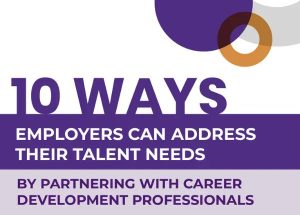With Canada’s unemployment rates reaching record lows in summer 2022 and ongoing labour shortages predicted across many sectors, employers will need new and innovative ways to recruit, retain and engage workers and to address staffing needs. Surprisingly, however, CERIC’s 2021 Career Development in the Workplace: National Business Survey found that only 21% of respondents were considering new recruitment policies and practices and only 18% were considering new retention practices. With competition for labour at an all-time high, the status quo seems like a less-than-ideal solution.
In this same CERIC survey, close to 90% of respondents noted it was at least somewhat important to help employees reach their career goals and 73% of respondents agreed it was important to provide career management support. Yet only 27% of respondents reported any investment in career management programs aimed at employees. Given that numerous studies have found employer investment in and support of career development improves employee recruitment, retention and engagement, it is clear there is a missed opportunity.
Uncertainty about how to proceed and fear of the unknown can be powerful motivators against change, even when existing strategies and systems are not working. This is especially true for small enterprises, which may not have a full-time HR function – or any HR function. Business leaders are already stretched thin, so trying to figure out how to improve the employee experience can be incredibly challenging, even when there is a clear need to change. This is where career development professionals (CDPs) have an incredible, and largely untapped, opportunity to share their expertise.
Much of the work done by CDPs – from helping clients set attainable career goals and navigate career transitions to developing strong work search documents and improving interview skills – is immediately applicable within organizations. However, the context and how these activities are framed and delivered are drastically different. Unfortunately, too few CDPs have the knowledge and skill to view their work through the employer’s lens, nor do they fully understand employer realities. Yet, if CDPs don’t bring their expertise to employers, they miss out on incredible opportunities to develop their own careers and to support Canada’s working population.
So, how do we get employers to invest in, and make time for, career initiatives and recognize CDPs as key experts in efforts to improve retention, engagement and productivity?
A critical first step is ensuring CDPs can demonstrate the added value of career development interventions, in a language that is easily understood and is situated in the context of employer needs. Part of this involves understanding the rich evidence base CDPs have access to. For instance, research supported by Canada’s Future Skills Centre that found “Career guidance and development are critical for both continued labour force attachment, overall wellbeing, economic security, and career satisfaction.”
Looking for more information to highlight the value and services career development professionals can provide to employers? Check out CERIC’s recently published toolkit: 10 Ways Employers Can Address Their Talent Needs by Partnering with Career Development Professionals.
Even more important is to link the work of CDPs to metrics that are vital to employers – things like recruitment, retention and engagement. For example, recent McKinsey and Company (2022) research found “41% of respondents cited lack of career development/advancement as #1 reason for quitting previous job.” Career development results in increased motivation, productivity and profitability, and is a key driver of a positive workplace culture.
An important piece is understanding how to work with individual employees and their employers when both parties become the client. The employee is the one receiving service, but the employer is often the one paying the bill. Focus too much on one, and the other may suffer. The needs and concerns of both are important.
There is also shared responsibility. Employees must be willing to engage in meaningful conversations about their goals for the future, take responsibility for actively managing their careers and recognize that their employers cannot make guarantees. As corporate career development expert Beverly Kay so eloquently said. Employers must provide the information required to help employees grow their careers within the organization and ensure managers and supervisors have the knowledge and skill to engage in career conversations.
With a deeper understanding of what career development looks like within an employment context and how to shift their communication to speak the language of employers, CDPs have unlimited opportunity to bring their expertise into business across sectors. Fundamentally, that is often all that it really is – speaking another language. The skills and knowledge are transferable; often only our language needs to shift.







